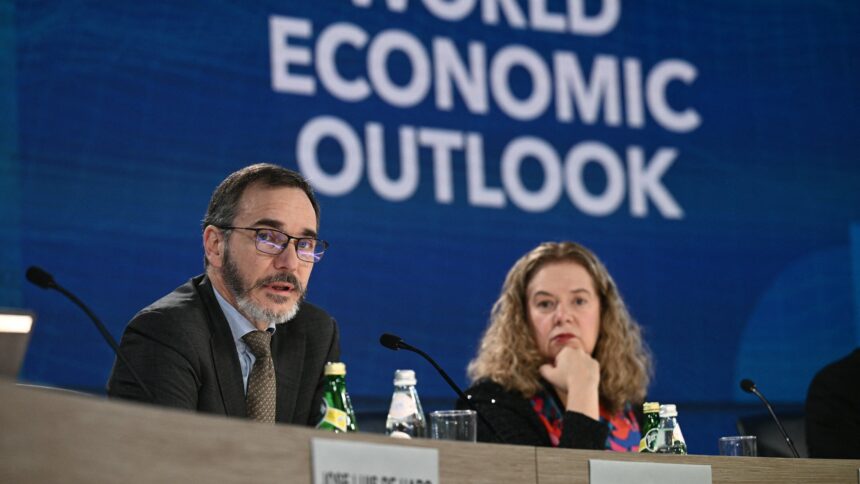Things look okay now. The job market is still growing, inflation isn’t as bad, and Wall Street is doing great. But the IMF thinks there are some problems underneath all that. Demand is going down, job growth is slowing, and new import taxes could make things worse.
Demand is going down
The IMF is worried that people aren’t buying as much stuff. After the pandemic, people were spending a lot on things like travel. Now, families are dealing with higher prices for food and rent. Plus, it costs more to borrow money for houses and credit cards. Companies are also being careful because they don’t know what’s going to happen. This is a big deal because what people buy makes up most of the U.S. economy. If people spend less, the economy will likely slow down, which could hurt the job market.
Import Taxes and Inflation
The IMF also said that the government’s import taxes could create even bigger problems. These taxes are raising the price of products for businesses and shoppers. Inflation has gotten better since 2022, but these added costs could make prices go up again. The Federal Reserve is trying to control inflation. The Federal Reserve is thinking about lowering interest rates to help the economy, but they might have to wait if the taxes push inflation up. This puts politicians in a tough spot. If they lower rates too soon, inflation could rise again. If they wait too long, the economy could slow down even more.

The Job Market
The job market is still okay, and job creation is slowing. Also, wage growth has slowed down. This is good for inflation, but it also means people are worried their pay won’t keep up with prices. The IMF said that if the job market gets worse, it could cause a chain reaction. People would have less money to spend, which would slow economic growth. Some people are already seeing this happen. There aren’t as many job openings as there were a couple of years ago, and some people are having a hard time getting better pay.
Global Impact
The IMF’s warning isn’t just about the U.S. economy. Because the U.S. is so important to global trade, any slowdown here can have effects everywhere. For example, if the U.S. buys less from other countries, it could hurt economies in Europe, Asia, and Latin America. Also, import taxes and trade problems add to global uncertainty. If it’s hard to get products from other countries, it can raise costs for companies and consumers everywhere.
What This Means
For regular people, the IMF’s message means things are uncertain. Inflation isn’t as bad as it was in 2022, but prices are still high. Food, housing, and healthcare are all expensive, and it’s harder to get loans for homes and cars. Plus, the job market doesn’t feel as strong as it used to. This doesn’t mean a recession will happen. The IMF isn’t saying things will collapse right away. But it does mean that problems could get worse if leaders don’t handle things carefully.
What’s Next?
The IMF is giving leaders some simple advice: keep fighting inflation, but don’t forget about the risk of a slowing economy. The Federal Reserve needs to think carefully about when to change interest rates. Congress and the White House need to consider how import taxes might be raising prices. The U.S. economy has surprised people before and done well when they thought it would crash. But there are limits. The IMF’s report is a reminder that even the U.S. needs to strike a balance between growth and stable prices and between protecting trade and having open markets.
For now, people in the U.S. can expect a mix of slow growth, high prices, and debate in Washington about what to do. The IMF’s warning isn’t a disaster, but it does suggest that things could be tough this year.











